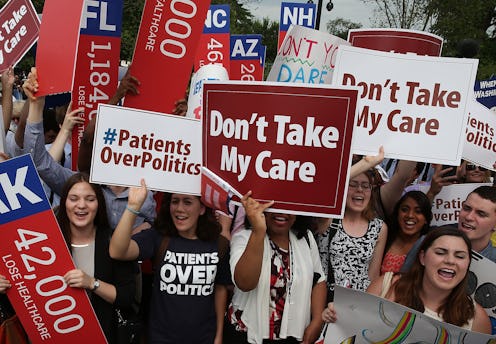The Supreme Court on Thursday ruled that federal subsidies offered under Obamacare are legal, a SCOTUS decision that has once again saved a crucial part of President Obama's Affordable Care Act. The 6-3 decision allows Americans in 34 states with federally run exchanges to continue receiving health care subsidies that allow individuals to access inexpensive health care independent from their employers. If SCOTUS' decision went the other direction, approximately 6.4 million people across the country would have lost access to affordable health care. But more specifically, though, the Obamacare ruling was a big win for mental health care.
In January, CNBC reported that thanks to Obamacare, approximately 3.7 million Americans with significant mental illnesses were able to seek treatment under affordable health insurance. There are multiple reasons for this. The first is that because Obamacare allows young people to remain on their parents' healthcare plans until the age of 26, this demographic has gone from being the most uninsured group to one that is most likely and able to seek affordable mental health care early on, which helps keep them out of the emergency room. Therefore, young Americans are able to access inexpensive insurance and higher quality care with lower treatment costs.
Secondly, people near or at the poverty line — many of whom are marginalized because of race, gender identity, and sexuality — have a higher chance of having a mental illness like depression or anxiety. They are generally exposed to more trauma and violence, and without the legalization of ACA subsidies, they would have had to live in fear of losing their insurance every time they lost or left a job. But with the subsidies, these communities are more likely to have the financial ability to access treatment if they want to do so.
The ACA is certainly not perfect, and we have a long way to go before mental health care coverage is adequate. One particularly important stride we must make is eradicating the stigmatization of mental illness, but that is a long process that requires structural change and compassion. As far as the ACA goes, though, we must first push for increased implementation and coverage for marginalized communities.
Although an estimated 8 million Americans are covered under the ACA, approximately 41 million still aren't, and that includes the nearly 4 million low-income Americans with mental illnesses who live in states that did not expand their Medicaid programs. But the ACA is a turning point, and with Thursday's SCOTUS ruling, many Americans can breathe a sigh of relief.
Images: Getty Images (2)
